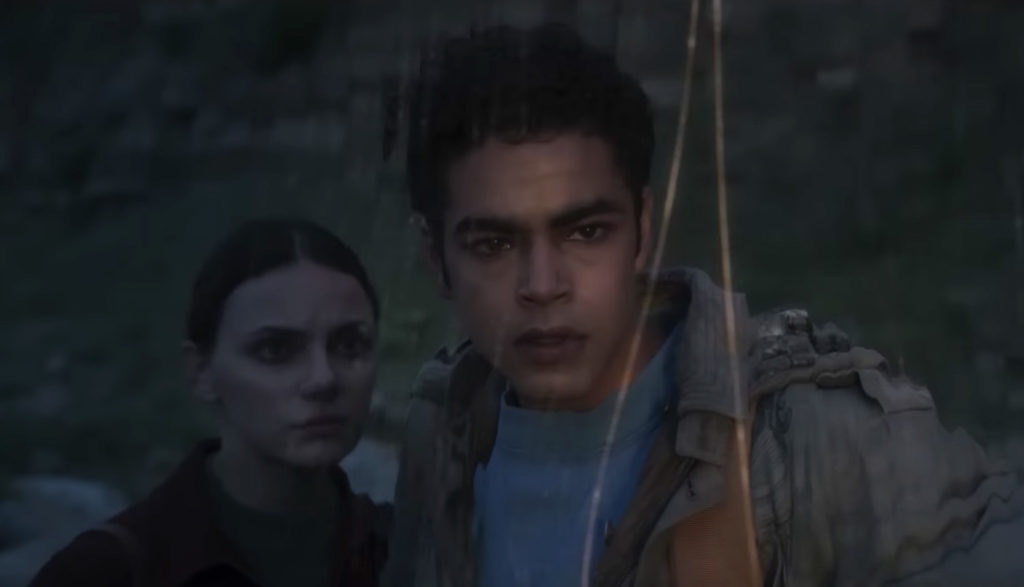
Unfamiliar
Filled with gritty violence and foul language, when it comes to this German spy drama, “unfamiliar” is how most viewers should stay.

Back in the day, when there were blank spots on the map, creative cartographers would slap a nifty drawing of a sea serpent or man-eating sloth or something where the map was barren. “Here there be monsters,” they might write. Not that they’d know, but no one was likely to contradict them anytime soon.
The alternate reality we find in HBO’s His Dark Materials is a world filled with monsters, both real and imagined. It seems the trick—both for the characters and viewers—is to know which is which.
In the alternate Earth of His Dark Materials, the North is a place where cartographers would’ve penciled in all sorts of monsters. It’s a place of deep mystery and, for the ruling Magisterium, of deep fear. Lord Asriel, intrepid explorer of the Arctic, knows why.
Asriel has found conduits to different worlds out there, worlds the Magisterium insisted were imaginary. The Magisterium doesn’t like its dogma questioned, and the religious/political governing body will do whatever it can to suppress the truth—even after the truth springs wide open.
Now, in Season Three, the Magisterium has been revealed to be but one arm of the Authority. And that Authority is nothing less than heaven itself, ruled by a self-styled Creator that demands obedience from the cosmos’ many worlds. The Creator is no such thing, we’re told: He’s merely an angel, and one of many. Still, it’s a daunting thing for humanity to attack such divine beings. Asriel has his work cut out for him.Young Lyra Belacqua and her animal daemon, Pan, have been thrown into this strange controversy.
She’s a special child, this one: Asriel dropped her off at Jordan College when she was just a baby, invoking “the privilege of scholastic sanctuary.” That privilege would ensure that the college would do everything in its power to keep her safe.
But Lyra can’t be kept safe and isolated forever. And indeed, by Season Three, she’s neither.
Many believe that Lyra’s a new Eve, with the ability to read a dust-driven compass. She’s met her equally special friend, Will, who wields a magical knife. And as Season Three opens, Lyra’s also in the clutches of Mrs. Coulter, her mother and, as of now, the wildest of wildcards in this strange game.
His Dark Materials is based on an acclaimed young-adult fantasy series written by Philip Pullman. It’s the second attempt to translate the work to screen, the first being 2007’s high-profile and commercially disappointing The Golden Compass. And at first glance, it might not strike the casual viewer as that much different from, say, the Harry Potter series or the series it’s been most compared to, The Chronicles of Narnia. Hidden worlds? Talking animals? You bet, it’s here.
But take a spade and turn just a bit of earth here, and you dig up something else entirely.
Your first hint would be, of course, those talking animals—called (as I’ve mentioned) daemons. They trace their lineage back—spiritually, if not literally—to the serpent in the garden of Eden, and Pullman’s world is one where biting into that ol’ bit of forbidden fruit was a good thing. Nothing wrong with a little knowledge, right?
But the Magisterium—clearly a stand-in for the Catholic Church—thinks the operative word is a little knowledge. In Pullman’s world, this all-powerful religious (and overtly Christian) body is an instrument of oppression and ignorance—one that the good guys must overthrow. And the truth of the thing called dust—a substance that (spoiler warning) the Magisterium believes to be the source of sin and others say is a sign of growing up and gaining consciousness—is at the center of it all.
And as we dive into the story more, His Dark Materials’ spiritual leanings sharpen. The show gives us mortals and angels looking to cast off the shackles of a dark, demanding divinity.
Jane Tranter, executive producer of HBO’s series, insists that His Dark Materials isn’t anti-Christian.
“Philip Pullman in these books is not attacking belief, is not attacking faith,” she told The Hollywood Reporter. “He’s not attacking religion or the church, per se. He’s attacking a particular form of control, where there is a very deliberate attempt to withhold information, keep people in the dark, and not allow ideas and thinking to be free. … It doesn’t equate to any particular church or form of religion in in our world. So we should be clear on that.”
Pullman himself would call that nonsense.
Granted, Pullman’s intentions are somewhat layered, but the outspoken atheist has not been coy about his feelings for the Catholic church, which (he told The Guardian) he hoped would “vanish entirely.” He’s been critical of C.S. Lewis’ Narnia series, saying that he hated them with a “deep and bitter passion.” And he’s wondered why Harry Potter stirred up such passion with Christians, given that his own books “are about killing God.”
This series shows the importance of dealing with a story’s substance in addition to its content issues. For if we set aside those theological issues, His Dark Materials appears relatively prim. The show, clearly aimed at children and teens, steers clear of explicit sexual content (though some affection between both same-sex and opposite-sex couples is shown). And while violence certainly will play a part as the series wears on, there’s little blood or gore on graphic display. Language is a minor concern, with but a few abrasive profanities scattered about.
Some Christians are fans of the series. Regardless of Pullman’s own feelings about faith, this is a series more about clerical overreach than degrading or debunking God Himself, they’d argue. And Pullman isn’t always so strident about the anti-religious leanings in his books. “What I’m against is what William Blake called single vision,” he told The New Yorker, “being possessed by one single idea and seeing everything in terms of this one idea, whether it’s a religious idea or a scientific idea or a political idea. It’s a very bad thing.”
Presumably, Pullman would argue that Jesus was dead wrong when He told us to “seek first the kingdom of God and his righteousness,” as He does in Matthew 6:33. He certainly argues that the tragedy of Eden we read about in Genesis was (if he took the story at face value) the best thing that could’ve possibly happened to us. The Fall? More like The Rise, he’d say.
Here they be monsters, the old cartographers wrote when they didn’t know what was actually there. In His Dark Materials, Pullman’s heroes try to fill in those spots and reveal, in his view, who the real monsters are. But when we expose one bogeyman—a straw one, in this case—we sometimes hide another. And this show, while not monstrous in terms of sex and violence, keeps time with fiendish intent and, potentially, beastly consequences.
Lyra is being kept in a stone chapel by Mrs. Coulter. She claims to be keeping Lyra safe. Lyra’s daemon, Pan, argues that Mrs. Coulter’s keeping them prisoner. Elsewhere, Asriel makes contact with Commander Ogunwe, whom he hopes will help lead Asriel’s forces against the forces of heaven; the Magisterium’s Father Luis Gomez tries to suss out Lyra’s whereabouts; and Lyra’s friend, Will—who’s also searching for her—is pursued across worlds by two angelic beings.
Those angelic beings, both represented as male, are apparently a couple. We see the two kiss each other as they prepare to go different ways. We see some tapestries depicting, apparently, Adam and Eve, in their pre-fall nudity (though their bodies are not sharply defined).
Mrs. Coulter keeps Lyra drugged and asleep, lying to someone who ventures too close to the chapel about Lyra’s true state. One of Ogunwe’s daughters is in a near-catatonic state and now the property of the Temple, the Authority’s arm in Ogunwe’s world.
Asriel rescues Ogunwe from his captors; the rescue involves a fight, with Asriel and some very tiny helpers attacking the guards—hitting, kicking, stinging them until they’re all either dead or unconscious. An armored, sentient polar bear, Iorek Byrnison, fights villagers who’ve captured one of his fellow bears. (He grabs one villager by the leg with his mouth and hurls him aside, and he headbutts another away.) An aircraft crashes. Magisterium clerics talk about imprisoning, whipping and perhaps killing others, sometimes using more veiled terms.
We hear one misuse of God’s name.
Lyra finds herself in a mostly abandoned city in, literally, a strange, new world. There, she and Pan run into Will, a traveler from a world that sounds much more like our own. They also encounter the child inhabitants of the city—abandoned when their own parents ran away or were attacked and possessed by evil specters. Meanwhile, the ruthless Mrs. Coulter—Lyra’s mother—tortures a witch to uncover more information about a disturbing prophecy.
The torture exacted on the witch involves Mrs. Coulter plucking and pulling strands of something from the witch’s body. The tortured creature calls on Yambe-Akka, the witch’s goddess of death, to come and claim her. Another witch (Ruta Skadi) does the deed, releasing her soul and attacking and killing a few of the witch’s captors. She also stabs Cardinal Sturrock (a bigwig in the Magesterium) in the chest: Mrs. Coulter reassures Father MacPhail, who might succeed Sturrock should he die, that she’ll “take care of” the Cardinal’s injuries (suggesting she’ll let the man die). Before the Cardinal’s untimely stabbing, he has a shouting session with Father MacPhail and others about the “heresy” of these new worlds. “It is hardly heresy anymore,” MacPhail says. “It is in the sky above our heads. The world is aware. We cannot ignore what everyone has seen—”. His line of reasoning is interrupted by the Cardinal smashing a bottle.
Mrs. Coulter tries to soothe Sturrock by offering him a glass of wine (which he takes), and she later tells MacPhail that the man never, ever refuses wine.
Will’s fascinated by Pan, Lyra’s daemon, saying that where he comes from, “demons” are evil. They also discuss the alleged connection between dust and sin—another word that, Will infers, has a much different meaning for Lyra than for him. He insists on leaving money for eggs that he’s taken. “Eating without paying is stealing,” he tells Lyra. “If you start acting like a grownup, the specters will get you,” Lyra retorts. We see a zombified young adult—a victim, it would seem, of those specters. Children taunt and perhaps prepare to kill a cat. The witch in captivity has clearly been beaten; her face bears heavy bruises.
For 12 years, the orphan Lyra has lived a sheltered life at Jordan College—learning her lessons, racing through its halls with her best friend (Roger) and eagerly anticipating each visit from her uncle Asriel, a scientist up north. But when Asriel stops by this time, he comes with some startling, heretical information that could upend the land’s theocratic ruling body, the Magisterium.
When Asriel leaves abruptly, Lyra makes acquaintance with Mrs. Coulter—another explorer who invites Lyra on a journey north herself. Before Lyra leaves, the college’s Master entrusts her with an alethiometer. “It tells you the truth,” the Master tells her, cautioning her to tell no one of it—even Mrs. Coulter. Meanwhile, children are being kidnapped by “the Gobblers,” including Roger, and Lyra’s determined to rescue him.
Most everyone has a talking animal companion named a daemon, and the link between human and daemon is “sacred,” we’re told. (Daemons can shapeshift until they choose a permanent form, which they typically do when a child reaches adolescence. We see a ceremony marking the occasion.) Lyra is tutored by the school librarian, and she learns a flipped version of the story of the Garden of Eden—where becoming “as gods, knowing good and evil,” is considered a positive turning point for mankind. (When Lyra misremembers the passage, saying that “I am a god knowing good and evil,” the librarian quickly corrects her.) On the chalkboard behind the librarian, we see a diagram depicting “earth” in one circle, “heaven” and “hell” in another. We read about witches and prophecies.
Someone tries to poison Asriel’s wine. Lyra knocks a glass of the poisoned drink from Asriel, and he later smashes the decanter itself on the ground. Asriel brings the head of a colleague to a meeting, frozen in a chunk of ice. (Asriel suggests he was murdered.) Two children are abducted—one onscreen. We see someone cover the boy’s mouth.
Lyra, 12, disobeys her teachers and drinks wine straight from a bottle. Secrets are kept. We hear “h—” once and the British profanity “bloody” once.

Paul Asay has been part of the Plugged In staff since 2007, watching and reviewing roughly 15 quintillion movies and television shows. He’s written for a number of other publications, too, including Time, The Washington Post and Christianity Today. The author of several books, Paul loves to find spirituality in unexpected places, including popular entertainment, and he loves all things superhero. His vices include James Bond films, Mountain Dew and terrible B-grade movies. He’s married, has two children and a neurotic dog, runs marathons on occasion and hopes to someday own his own tuxedo. Feel free to follow him on Twitter @AsayPaul.

Filled with gritty violence and foul language, when it comes to this German spy drama, “unfamiliar” is how most viewers should stay.

Oliver Twist’s Artful Dodger isn’t 13 anymore: He’s an adult. And being an adult comes with more grown-up problems.

Though it’s compelling, the content concerns in Prime Video’s ‘Cross’ might be enough to cross it off your watch list.

‘The ‘Burbs’ is Peacock’s attempt to adapt the 1989 movie of the same name. But a fresh coat of paint doesn’t hide the content issues.